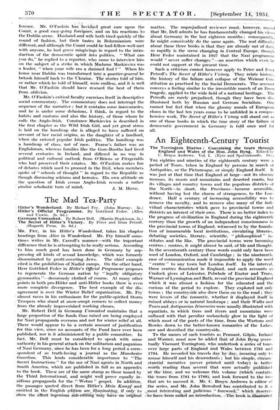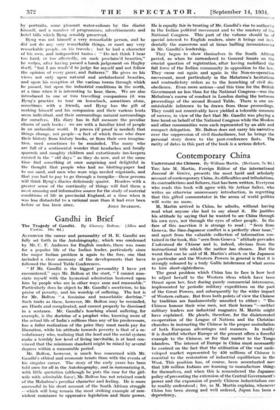An Eighteenth-Century Tourist
The Torrington Diaries : Containing the tours through England and Wales of the Hon. John Byng. Edited by C. Bruyn Andrews. Vol. I. (Eyre and Spottiswoode. 18s.) THE eighties and nineties of the eighteenth century were a period of Tours, taken in England by persons in search of Antiquities, or the Picturesque, or simply England itself. It was just at that time that England at large—not its obscure
recesses, its moors and mountains and deserted coasts, but its villages and country towns and the populous districts of the North—in short, the Provinces—became accessible, without having lost the charm of strangeness, to the Lon- doner. Half a century of increasing accessibility was to remove the novelty, and to remove also many of the indi- vidual characteristics which gave to provincial towns and districts an interest of their own. There is no better index to the progress of eivilizatiOn in England during the eighteenth century than the growth of an independent consciousness in the provincial towns of England, witnessed to by the founda- tion of innumerable local institutions, circulating libraries, debating societies, literary, scientific, " philosophical " in- stitutes and the like. The provincial towns were becoming centres ; centres, it might almost be said, of life and thought. In the seventeenth century these words could only have been used of London. Oxford, and Cambridge ; in the nineteenth. ease of communication made it impossible to apply the word
centre " to any town but London itself. In the interval, these centres flourished in England, and such accounts as
Cradoek gives of Leicester, Polwhele of Exeter and Truro, Warner of Lymington and Bath, reveal the provincial England
which it was almost a fashion for the educated and the curious of the period to explore.. They explored not only towns ; the countryside also drew them on to the road ; they were lovers of the romantic, whether it displayed itself in ruined abbeys or in natural landscape ; and their Walks and Tours and Antiquaria. n Itineraries were usually illustrated with aquatints, in which- trees and rivers and mountains were suffused with that peculiar melancholy glow in the light of which most of the poets of the time, from the Wartons and Bowles down to the better-known romantics of the Lakes,
saw and described the countryside.. _
To the names of such tourists as Pennant, Gilpin, Ireland and Warner, must nowbe added &it 'Of johii.Byng (even- tually Viscount Torrington), whd undertook a series of tours over large parts of England and Wales between 1781 and
1794. He recorded his travels day • by day, meaning only to amuse himself and his descendants ; but his simple,. circum- stantial narrative (never printed until today) is better worth reading than several that were actually publiSbed
at' the time, and we welcome this volume (which contain,
thb tours' from 1781- to 1788), and look forward to the tin that are to succeed it. Mr. C. Bruyn Andrews is editor of
the series, and Mr. John Beresford has contributed to it a most interesting and judicious " foreword," which deserve, 2-to-have-been. called an-introduction. --The- book is.which_
by portraits, some pleasant water-colours by the diarist himself, and a number of programmes, advertisements and hotel bills _which Byng sensibly preserv-5d.
Byng was not himself a very remarkable person, and he did not do any very remarkable things, or meet any very remarkable people, on his travels ; but he not a character of his own, and- independent tastes : " Do not think I bear too hard, or too affectedly, on such proclaim'd beauties," he writes, after having passed a harsh judgement on Hagley itself, "but I am resolv'd to judge for myself and not follow the opinion of every gazer, and flatterer.". He gives us his views not only upon natural and architectural beauties, and upon his reception at the various towns through which he passed, but upon the industrial conditions in the north, at a time when it is interesting to hear, them. We are also introduced to one or two travelling companions (it was Byng's practice to tour on horseback, sometimes alone, sometimes with a friend), and Byng has the gift of making himself and his companion and their various hosts seem individual, and their surroundings natural surroundings for ourselves. His diary has in full measure the peculiar charm of such books : we are with a familiar kind of people in an unfamiliar world. It proves (if proof is needed) that things change, not people—a fact of which those who draw their history from history books, or from their own imagina- tion, need sometimes to be reminded. The many who are full of a sentimental wonder that headaches and family quarrels and naughty children and extortionate inn-keepers existed in the " old days " as they do now, and at the same time find something at once surprising and delightful in the thought that people who had no blotting-paper had to use sand, and men who wore wigs needed wigstands, and that you had to pay to go through a turnpike—these,persons will think Byng's diaries deliciously quaint. Readers with a greater sense of „the continuity of things will find them a most amusing and informative source for the study of material conditions of life in provincial .England, at a time when it was less distasteful to a rational man than- it had ever been











































 Previous page
Previous page